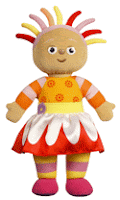 Anyone who has a baby is likely to have seen the sweet little programme "In the Night Garden". It is a magical garden that the main character Iggle Piggle goes to at night when he falls asleep, to play with the other characters Upsy Daisy, Makka Pakka, the Tombliboos, the Pontipines and the Wottingers, unique wildlife - the Titifers and Hahoos and even sentient transportation in the form of the Ninky Nonk and the Pinky Ponk. Everything in this programme is magical and great fun, reminiscent for me of Bagpuss, The Clangers and The Teletubbies. Jasmine loves the programme and the characters and claps and smiles and dances to the songs. All the parents I know who have little ones tell me their kids love it too. Now that a toy range has been manufactured, its set to make a killing. Anyway hearing that the toys were available and Jasmine having received birthday money I decided to get her the doll Upsy Daisy, one of the main characters and the only female character available.
Anyone who has a baby is likely to have seen the sweet little programme "In the Night Garden". It is a magical garden that the main character Iggle Piggle goes to at night when he falls asleep, to play with the other characters Upsy Daisy, Makka Pakka, the Tombliboos, the Pontipines and the Wottingers, unique wildlife - the Titifers and Hahoos and even sentient transportation in the form of the Ninky Nonk and the Pinky Ponk. Everything in this programme is magical and great fun, reminiscent for me of Bagpuss, The Clangers and The Teletubbies. Jasmine loves the programme and the characters and claps and smiles and dances to the songs. All the parents I know who have little ones tell me their kids love it too. Now that a toy range has been manufactured, its set to make a killing. Anyway hearing that the toys were available and Jasmine having received birthday money I decided to get her the doll Upsy Daisy, one of the main characters and the only female character available. 
When I saw the doll I was shocked. Upsy Daisy is black doll in the show, but the doll available for sale is not. The doll is identical to the TV character in every other way. Now Jasmine being the product of a mixed race couple, I feel that the messages we, her parents give her about race, particularly at this early stage of her development are vital to her confidence and pride as an adult, especially if we are to counteract the overwhelming negativity of the both subliminal and overt messages portrayed about black and mixed race people in the media and in the marketplace. I felt that in addition to the charming story and characters, to make one of the main characters of this mainstream children's show a black character was a very positive thing. I thought kudos to the BBC and Ragdoll Worldwide for their positive reflection of a multicultural society. Sadly that positivity did not extend to their merchandising. You can see more views on this here http://www.newstatesman.com/200708020019 and http://news.scotsman.com/entertainment.cfm?id=1351362007
I quote from news.scotsman.com
"Ragdoll Worldwide, the production company which makes In the Night Garden for the BBC, told The Scotsman it had decided that toys from the series did not have to exactly resemble those seen on screen. Andrew Kerr, its spokesman for global licensing and marketing, said: "In spite of their various differences, the characters co-exist and interact in simple and charming ways. The toy range reflects this diversity. "We decided that their colours, shapes and sizes would be dealt with playfully, as they are in the television programme, and as a result do not always bear an exact resemblance to what is seen on screen. "Regarding Upsy Daisy, her face-tone will no doubt vary both darker and lighter in future interpretations."
Now Ragdoll worldwide may have decided that the toys do not have to replicate the shows characters and interpret the toys "playfully" but why is it that the only thing the have "played" with is Upsy Daisy's complexion while all the toys including Upsy Daisy remain identical and true to the characters in every other respect? As for varying Upsy Daisy's face-tone, it seems this will not be happening anytime this side of Christmas. If you would like to tell Ragdoll Worldwide what you think, nickk@ragdoll.co.uk (Nick Kirkpatrick, Head of International Sales) matts@ragdoll.co.uk (Matt Schweitzer, Senior Manager Media and Merchandising) lynng@ragdoll.co.uk (Lynn Godfrey Senior Director of Marketing).
Also quoted from the news.scotsman.com article is
"A spokeswoman for the National Assembly Against Racism said: "By replacing the only brown character with a white-tinted doll, it looks as if the producers of the doll have reverted to racist 1950s attitudes. The BBC should pull its contract with the manufacturers immediately.""
The NAAR site can be found at http://www.naar.org.uk/index.asp. This statement brought to mind this video http://www.youtube.com/watch?v=z0BxFRu_SOw&mode=related&search= where a 17 year old student Kiri Davis examines opinions regarding skin colour and race and recreated the the famous doll experiment of the 1940's by psychologist Dr. Kenneth Clark.(more info http://www.teachersdomain.org/resources/iml04/soc/ush/civil/clark/index.html) It shows that negative attitudes regarding race absorbed by the very young in the 1940's are still prevalent in the very young today. Toys DO make a difference, positive images of black characters in mainstream children's programmes ARE important to the self esteem and development of youngsters. For the BBC and Ragdoll Worldwide to make such a positive, constructive step forwards only to renege when it comes to merchandising shows that educating our children is not the focus of their activities, maximising merchandising profits is, and the fact is a black Upsy Daisy might not deliver as high a profit. I say might because bearing in mind the popularity of the programme, a stand could have been taken, a step towards changing outdated concepts, but it seems that Ragdoll weren't brave enough to find out, to take the risk of putting principals in front of lesser profits. It seems clear that while they are happy to have a black Upsy Daisy in the programme, they do not have the balls to stick to their multi-cultural convictions in the face of the expected pre-Christmas toy rush. Below is the post that I submitted to the Cbeebies Grown Ups Message Board. ( http://www.bbc.co.uk/dna/mbcbeebies/F2704763 )



